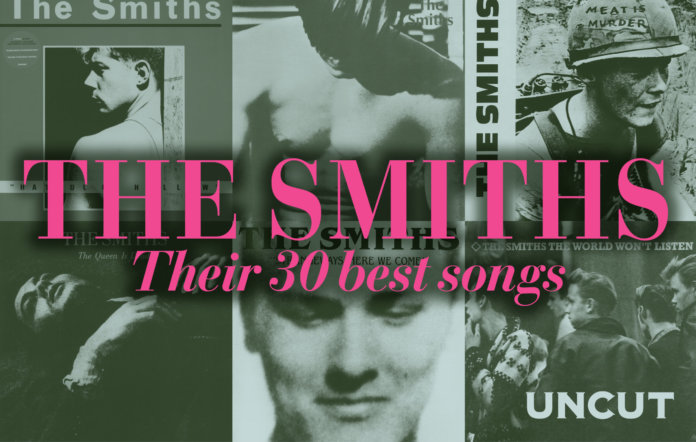22 SHOPLIFTERS OF THE WORLD UNITE
Single (January 1987). Highest chart position: 12
After 12 singles, the guitar hero in Johnny Marr finally breaks free with an oddly Brian May guitar solo, while Morrissey yawns at the real world and plots global insurrection.
SUGGS: A fantastic song with a great sentiment. Every boy of a certain age has stolen a packet of Smarties from a sweet shop at some point – it certainly took me back to being a spotty child with my nose just over the counter. The idea of all these shoplifters uniting was an image only Morrissey could have come up with. The idea that everyone could take a little bit for themselves if they didn’t have too much.
I came to The Smiths quite late. What struck me was that bands like Madness, Dexys and The Smiths all had identifiable personalities. At first I didn’t get Morrissey. A lot of the DJs thought it was boring and depressing, and the humour took a long time to reach me. But then you’d read interviews and realise he was a witty and amusing person.
I went on to work with Morrissey because he professed to being a Madness fan. He was working with our producer, Clive Langer, and he asked me to do some backing vocals on “Piccadilly Palare”. He said, “Just sing the first thing that comes into your head!” So I did!
A lot of people remember Madstock. It was two nights in Finsbury Park, a comeback thing, and Morrissey wanted to play with us. The first night, he got his Union Jack out. It wasn’t the best reception, although I didn’t think it was that terrible. Unfortunately, there weren’t many Morrissey fans there, so he pulled out. I rang him up the next day and he was like, “Oh I can’t possibly do it, Suggs. I nearly lost an eye.”
Then, on the second night, there were 3,000 Morrissey fans there and no Morrissey! So they gave us a hard time. But in that ubiquitous way of his, he still ended up getting all the headlines!
21 THE BOY WITH THE THORN IN HIS SIDE
Single (September 1985). Highest chart position: 23
In his best Frank Ifield yodel, Morrissey offers a “plundering desire for love” as the alibi for his long list of murderous grievances and perhaps disingenuously presents himself as a martyred apostle of peace, while Marr plucks out a limpid, pastoral take on Chic-funk.
DAN GILLESPIE, THE FEELING: When I was about 15, my 17-year-old brother sneaked me into an indie club, The Dome in Tufnell Park. The night was called Looney Tunes and this was where I first properly heard The Smiths. It was 1994 and I was a Suede fan. I recall every Suede song played that night being followed immediately by a Smiths hit. The DJ clearly felt the need to make a point. This song is about a love that’s doomed to fail, possibly because the lovers aren’t prepared to admit to their true feelings. Morrissey sings, “Behind the hatred there lies a murderous desire for love”. He ends with some of the most delicious yodelling he’s ever put on record. It has all the elements of a perfect Smiths song.
_______________________
20 FRANKLY, MR SHANKLY
From the album The Queen Is Dead (June 1986, highest chart position: 2)
A vaudevillian take on Billy Liar’s resignation scene, with Morrissey at his most waspishly inspired: “I want to live, I want to love, I want to catch something that I might be ashamed of”.
BEN GIBBARD, DEATH CAB FOR CUTIE: Lyrically it’s so typically Morrissey: narcissistic and insecure, craving fame and adulation while at the same time questioning if he’s up to the task of being an idol. Musically I like the offbeat upstroke, it’s quite audacious. It’s not everybody’s favourite Smiths song, but I like the way it sits on the album.
It’s amazing that The Smiths made – and continue to make – an impact on US teenagers, given that their music has never been played on the radio, and they’re so English to the point of being unrelatable. Where their lyrical themes touch on what it feels like to grow up awkward and isolated with such poignancy, I suppose that’s universal. They’ve always had a cultural relevancy in America above and beyond any other British band. Any band that gets hyped in Britain will always garner a certain cachet with trendy Anglophiles, but The Smiths transcend that. They mean something to American teenagers on their own terms.



